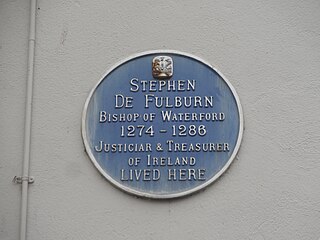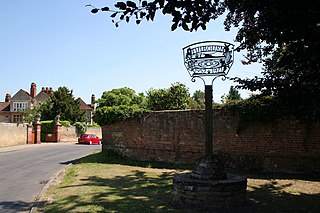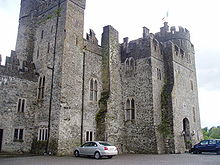
Walter de Lacy was lord of Meath in Ireland. He was also a substantial land owner in Weobley, Herefordshire, in Ludlow, Shropshire, in Ewyas Lacy in the Welsh Marches, and several lands in Normandy. He was the eldest son of Hugh de Lacy, a leading Cambro-Norman baron in the Norman invasion of Ireland, and Rohese of Monmouth.
John FitzThomas was an Anglo-Norman in the Peerage of Ireland, as 4th Lord of Offaly from 1287 and subsequently as 1st Earl of Kildare from 1316.
Thomas de Clare, Lord of Thomond was an Anglo-Norman peer and soldier. He was the second son of Richard de Clare, 6th Earl of Gloucester and his wife Maud de Lacy, Countess of Gloucester. In 1272 he served a term as Lieutenant of the Duchy of Aquitaine. On 26 January 1276 he was granted the Lordship of Thomond by Edward I of England; he spent the next eight years attempting to conquer it from the O'Brien dynasty, kings of Thomond.

Stephen de Fulbourn was an English-born cleric and politician in thirteenth-century Ireland: he was Justiciar of Ireland, and Archbishop of Tuam 1286–88. He was a member of the Order of Knights Hospitallers.
Roger Utlagh, or Roger Outlawe was a leading Irish cleric, judge and statesman of the fourteenth century who was Prior of Kilmainham, and held the office of Lord Chancellor of Ireland. He was the brother-in-law of the celebrated Witch of Kilkenny, Alice Kyteler, and is mainly remembered today for his efforts to shield her from prosecution, and subsequently enabling her to escape punishment, during the Kilkenny Witch Trials of 1324.

Walter de Fulburn, or de Fulbourn was a leading English-born statesman and cleric in medieval Ireland, who held the offices of Bishop of Waterford, Bishop of Meath and Lord Chancellor of Ireland.
Sir John Morice, Morris or Moriz was an English-born statesman of the fourteenth century whose career was mainly spent in Ireland. He is remembered chiefly for his enthusiastic, if not very successful, efforts to reform the Irish administration, and for the fact that a portrait of him still exists. This is said to be the earliest portrait of an Irish judge and can be viewed by the public.
Walter de Thornbury was an English-born statesman and cleric who held the office of Lord Chancellor of Ireland in the 14th century. His efforts to secure confirmation of his election as Archbishop of Dublin ended in tragedy with his death in a shipwreck.
John Frowyk was an English-born cleric and judge in fourteenth-century Ireland.
John L'Archers, Larger or L'Archer was an English-born cleric and judge who had a distinguished career in Ireland, holding the offices of Lord Chancellor of Ireland and Deputy Justiciar. He died during the first outbreak of the Black Death in Europe and was probably a victim of it.
John de Burnham, or John Brunham was an English-born cleric, judge and Crown official who spent much of his career in Ireland. He held office as Lord High Treasurer of Ireland and Chief Baron of the Irish Exchequer. He spent many years defending himself against charges of corruption, which seem to have been the invention of malicious colleagues.
Robert de Emeldon, or Embleton was an English-born Crown official and judge who spent much of his career in Ireland. He held several important public offices, including Attorney-General for Ireland, Lord High Treasurer of Ireland and Chief Baron of the Irish Exchequer. He was a turbulent and violent man, who was guilty of at least one homicide, was imprisoned for a number of serious crimes including rape and manslaughter, and had a reputation for corruption: but he was a royal favourite of King Edward III and was thus able to survive his temporary disgrace in the early 1350s.
Hugh de Burgh was an Irish lawyer, Crown official and judge who held the offices of Lord Treasurer of Ireland and Chief Baron of the Irish Exchequer, and was praised for his good service to the English Crown and pardoned of accusations of maladministration.
Robert Preston, 1st Baron Gormanston was an Anglo-Irish nobleman, statesman and judge of the fourteenth century. He held several senior judicial offices including, for a brief period, that of Lord Chancellor of Ireland. He was the founder of the leading Anglo-Irish Preston family whose titles included Viscount Gormanston and Viscount Tara.
Sir Thomas Mortimer was a medieval English soldier and statesman who served briefly in several important administrative and judicial state offices in Ireland and played a part in the opposition to the government of King Richard II. He was an illegitimate member of the Mortimer family, who were one of the leading noble houses of England and Ireland, and he helped to manage the Mortimer lands during the minority of the family heir, his nephew Roger, earl of March. Sir Thomas was also a close associate of the Lords Appellant, the powerful faction of nobles who opposed the administration of King Richard II.
Hugh Canoun, or Hugh Canon was an English-born judge in early fourteenth-century Ireland. He was a justice of the Court of Common Pleas (Ireland) and served as Deputy Justiciar of Ireland. As a judge he was praised for his good and faithful service to the English Crown, and as a lawyer he was known as "a man very knowledgeable about all the King's business". On the other hand, his loyalty to the Crown during the Scottish Invasion of Ireland in 1315-18 was said to be extremely doubtful, although he was saved from disgrace by his influential connections. He was murdered by Andrew de Bermingham of Athenry in 1317/18, during the last months of the Bruce Invasion, in the course of a private feud, of which little is known.
Nicholas de Clere, or le Clerk was an English-born Crown administrator in the late thirteenth-century Ireland. He was a skilled financier who achieved high Government office, becoming Lord Treasurer of Ireland, but he faced serious charges of corruption, as a result of which he was removed from office. He was ruined financially by the huge debts he owed to the Crown, and spent his last years in prison.

Sir William de Essendon, de Estdene or Eastdean was an English-born cleric, lawyer and Crown official, much of whose career was spent in Ireland in the reign of Edward I of England and his son. He served twice as Lord High Treasurer of Ireland, and had a high reputation for integrity and efficiency.
William fitz Roger was an Anglo-Norman cleric, judge and Crown official in late thirteenth-century Lordship of Ireland. He was Prior of the Irish House of the Knights Hospitallers at Kilmainham, and served as a Privy Councillor and as a justice in eyre. He led several military expeditions, but was a notoriously incompetent commander, whose campaigns invariably ended in failure. He served as Deputy Justiciar in 1284-5, and as acting Justiciar of Ireland in 1294.
Sir Thomas Fitzadam was a leading Irish administrator and judge during the reigns of King John and his son Henry III of England. He held a wide variety of official positions, including military commander, Constable of Dublin Castle, Chief Escheator of Ireland and Chief Forester of the Royal Forest of Glencree. He was one of the first three judges to be appointed an itinerant justice in Ireland.




